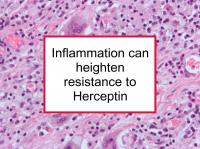HER2 overexpressing (HER2+) breast cancer has an aggressive profile, in part because HER2 has a role in cell growth and differentiation. The use of trastuzumab (Herceptin) can markedly improve the prognosis of HER2+ breast cancer. However, the development of cancer cell resistance to trastuzumab can limit its usefulness.
Previous studies have reported that systemic inflammation promotes HER2+ breast cancer progression. Now a new study has demonstrated that an inflammatory pathway can promote trastuzumab resistance in breast cancer stem cells.
Latest research explains inflammation/trastuzumab resistance link
The study referenced at the beginning of this news article was designed to investigate the role of the PTEN gene (a tumor suppressor gene) in the development of resistance to the trastuzumab. Up to half of HER2 tumors are resistant to trastuzumab from the start of treatment and most will become resistant over time. Inactivation of the PTEN gene has been reported to be involved in the development of such resistance, but the mechanism of action has not been explained.
To conduct the study, the authors generated trastuzumab-resistant cells by extinguishing PTEN expression in HER2 overexpressing breast cancer cells. The authors then demonstrated that development of trastuzumab resistance in these cells was mediated by activation of an IL6 inflammatory feedback loop. The IL6 gene encodes interleukin-6 (IL-6), a protein that is secreted by immune cells. Reducing PTEN expression was found to result in an increase in the proportion of cancer stem cells in the breast cancer cell population. Breast cancer stem cells have the ability to divide indefinitely, driving tumor development and metastasis.
Long-term treatment with trastuzumab results in highly enriched cancer stem cells which secrete more than 100 times the IL-6 as regular cancer cells. In additional experiments, the authors demonstrated that tumor-bearing mice treated with an IL-6 blocker in addition to trastuzumab did not develop resistance to trastuzumab. The IL-6 blocker interrupted the inflammatory feedback loop. This reduced the cancer stem cell population, which in turn reduced tumor growth and metastasis in the mice. The authors conclude that resistance to trastuzumab may be mediated by an IL6 inflammatory loop and suggest that blocking this loop could provide a strategy for overcoming such resistance. The researchers are developing a clinical trial (which may open in 2013) to test the IL-6 blocker tocilizumab in conjunction with trastuzumab.
Olive oil and green tea both may counteract resistance to trastuzumab. Please see our articles on what to eat during trastuzumab treatment and HER2+ prognosis for more information.
